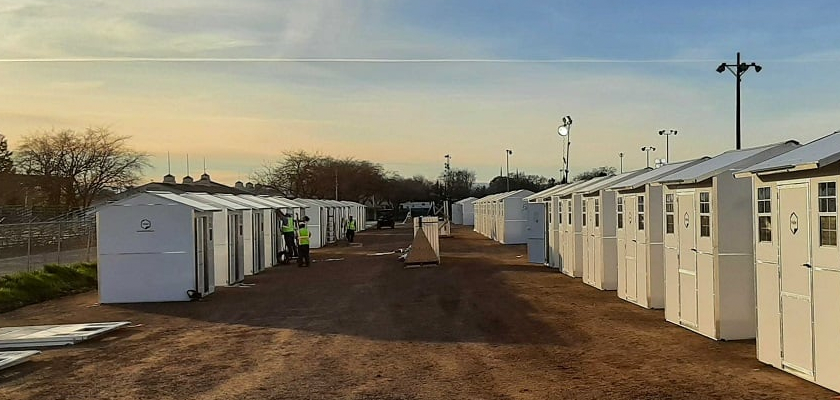Left-wing national media outlet Vice released a story on Thursday morning that cited staunch critics of liberal Democrat and Birmingham Mayor Randall Woodfin’s new “micro-shelter” program, which he suggests will help solve the homelessness problem in the city.
Micro-shelters are small, lockable, one-room shelters with power, heating and air conditioning. The city intends to purchase up to 100 of these shelters from Pallet Shelter and place them in communities. Pallet Shelter has constructed micro-shelter communities around the country, including several on the West Coast.
The Birmingham City Council unanimously passed a measure to move forward with the micro-shelter plan last week.
Woodfin announced the plan on his Twitter account several days in advance, labeling it “Home for All.”
Birmingham director of Community Development Meghan Venable-Thomas told the city council that the project will be a partnership with public service providers who the city will select through the request for proposal (RFP) process.
The Vice article cited criticism from “advocates of the unhoused” who claimed the shelters were too small and railed against the city hiring for-profit companies, Pallet Shelter included, to get the job done.
It also mentioned police sweeps of homeless encampments done in Los Angeles County, California, that preceded similar developments and cited critics who say that the shelters help justify “heavy-handed crackdowns” on homeless people who live elsewhere.
Some critics even compared the plan to private prisons, jail cells, concentration camps and Hoovervilles.
According to the article, although some homeless people have had positive experiences with the micro shelters in other cities, some homeless people have refused to live in them because of the rules placed on the community, such as limits on visitors and curfews.
On the other hand, the article stated that the shelters might present safety concerns. Several fires have broken out in Pallet villages in California. One in Redlands destroyed 20 of the shelters.
A spokesperson for Woodfin’s office said that officials will regularly inspect and perform maintenance on the units to make sure proper safety measures are in place. The shelters are also supposed to be equipped with fire extinguishers, smoke alarms and carbon monoxide detectors.
However, a safety concern not mentioned in the Vice article is substance abuse.
As much as 75% of Birmingham's homeless population suffers from substance abuse. An even larger percentage suffers from mental and physical health conditions, and at least half experience all three.
“Non-profit service providers must submit their proposals with detailed plans which include safety and security policies and substance policies,” Woodfin’s director of communications Rick Journey told 1819 News on Thursday. “Any location for Home for All will have a restriction on illegal narcotics. Police procedures would be the same requirements as in a typical setting. Same for emergency response.
According to the data presented to the city council by Venable-Thomas, Birmingham's homelessness is on the rise.
Jefferson County has around 943 homeless on a given night. Though most of them are sheltered in an emergency shelter or in transitional housing, 343 people are currently unsheltered, 267 of whom are chronically homeless.
Simultaneously, Birmingham posits one of the highest vacancy rates in the country at 13.2%.
According to Pallet, the shelters start at $6,995 each, although the Vice article says Birmingham’s plan will cost $11,500 per unit. The latter number is inclusive of taxes, assembly, delivery, heating and cooling.
Nevertheless, Venable-Thomas could not yet provide a projected cost for the site's day-to-day operations at the city council meeting in which the plan was approved. She said the city would only have an idea of the cost following the request for proposal (RFP) process. She also insisted there's no proper way to predict how much the project will cost based on similar projects outside Alabama.
Woodfin said the city would help pay for the community's operations with community development block grant dollars. The service providers would also help pay, and he said he thinks others in the private sector will help pay while utility companies will lower costs for the project.
However, according to Woodfin, the city can cancel the contract if no public service provider meets their standards. The shelters will only be officially purchased and delivered when an RFP application has been approved.
1819 News asked Journey for a response from Woodfin to the Vice article on Friday morning but received a notification that he was out of the office. 1819 News contacted the Office of Public Information directly and received no response.
To connect with the author of this story, or to comment, email will.blakely@1819news.com or find him on Twitter and Facebook.
Don’t miss out! Subscribe to our newsletter and get our top stories every weekday morning.










